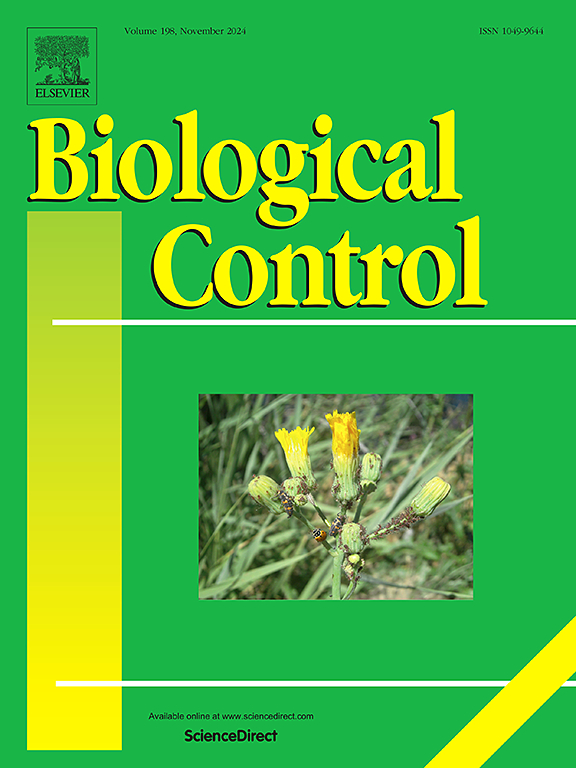Weekly pollen supply optimises the control of the tomato russet mite (Aculops lycopersici) by Pronematus ubiquitus
IF 3.4
2区 农林科学
Q2 BIOTECHNOLOGY & APPLIED MICROBIOLOGY
引用次数: 0
Abstract
Biological control using natural predators offers a sustainable alternative to synthetic pesticides in agriculture. However, the successful use of biological control agents is often hindered by factors such as food availability and environmental conditions. This study investigated the role of the predatory mite Pronematus ubiquitus in the biological control of Aculops lycopersici, the tomato russet mite, in a controlled greenhouse environment. The effect of different pollen feeding frequencies on P. ubiquitus populations and its ability to suppress A. lycopersici infestation and damage were examined. Our results show that weekly pollen feeding maintained higher P. ubiquitus populations than feeding once every two or three weeks, by 60 % and 90 %, respectively. Consequently, it effectively limited A. lycopersici damage to tomato plants. However, a rapid decline in predator populations was observed after reaching peak levels, probably due to factors such as cannibalism and resource quality. While the treatment with weekly pollen supply resulted in minimal plant damage, lower pollen frequencies (once every two or three weeks) also provided some level of control. These findings highlight the importance of balancing predator population growth with sustainable food sources to optimize biological control strategies. This study contributes to the ongoing development of integrated pest management techniques in crop production systems, emphasizing the need for tailored approaches to predator food supply and population management.
每周的花粉供应优化了泛斑原蝇对番茄赤褐色螨(aclops lycopersici)的控制
利用自然捕食者进行生物防治是农业中合成农药的可持续替代品。然而,生物防治剂的成功使用往往受到诸如粮食供应和环境条件等因素的阻碍。在温室环境下,研究了掠食性螨proematus ubiquitus对番茄赤褐色螨(aclops lycopersici)的生物防治作用。研究了不同花粉取食频率对泛孢假单胞菌种群数量的影响及其对番茄红霉侵染和危害的抑制能力。结果表明,与每2周和每3周采食一次花粉相比,每周采食一次花粉能维持较高的褐飞蛾种群数量,分别高出60%和90%。有效地限制了番茄红霉对番茄植株的危害。然而,在达到峰值水平后,捕食者种群数量迅速下降,可能是由于同类相食和资源质量等因素。虽然每周提供花粉的处理对植物的损害最小,但较低的花粉频率(每两到三周一次)也提供了一定程度的控制。这些发现强调了平衡捕食者种群增长与可持续食物来源的重要性,以优化生物控制策略。这项研究有助于作物生产系统中综合虫害管理技术的持续发展,强调需要针对捕食者食物供应和种群管理采取量身定制的方法。
本文章由计算机程序翻译,如有差异,请以英文原文为准。
求助全文
约1分钟内获得全文
求助全文
来源期刊

Biological Control
生物-昆虫学
CiteScore
7.40
自引率
7.10%
发文量
220
审稿时长
63 days
期刊介绍:
Biological control is an environmentally sound and effective means of reducing or mitigating pests and pest effects through the use of natural enemies. The aim of Biological Control is to promote this science and technology through publication of original research articles and reviews of research and theory. The journal devotes a section to reports on biotechnologies dealing with the elucidation and use of genes or gene products for the enhancement of biological control agents.
The journal encompasses biological control of viral, microbial, nematode, insect, mite, weed, and vertebrate pests in agriculture, aquatic, forest, natural resource, stored product, and urban environments. Biological control of arthropod pests of human and domestic animals is also included. Ecological, molecular, and biotechnological approaches to the understanding of biological control are welcome.
 求助内容:
求助内容: 应助结果提醒方式:
应助结果提醒方式:


